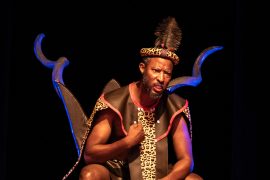In a world that often celebrates individuality and diversity, one might assume that being different is universally encouraged. But in Namibia? Not so much. The reality is quite the opposite.
In Namibia, standing out, embracing uniqueness, or simply choosing a path that diverges from the norm is often met with resistance, misunderstanding, and even discouragement. But why is it so discouraging to be different in Namibia?
The Weight of Cultural Expectations
Namibia is rich in tradition, where cultural values and norms hold significant weight. Growing up in a traditional Namibian (or African) home, you quickly learn there’s a list of things you just can’t do—and a whole list of things you must do. These traditions provide a sense of identity and community, but they also create an environment where conformity is expected. The pressure to adhere to established norms can be stifling, especially for those seeking to explore their individuality or break away from conventional roles.
Young Namibians who pursue careers in the arts or other non-traditional fields often find themselves at odds with societal expectations, facing questions and doubts from those who may not understand or value their choices. It’s the same reason the LGBTQIA+ community is still fighting for rights in an independent Namibia. It’s the same reason the creative industry is still fighting for financial aid and support. It’s the same reason we don’t see the Namibian flag parading global sports events as often as we should.
Fear of Social Rejection
In Namibia, as in many African countries, community is highly valued, making the fear of social rejection a powerful deterrent to standing out. Being different often means challenging the status quo, which can lead to alienation or criticism from peers, family members, or the broader community. This fear of rejection discourages individuals from expressing their true selves, leading them to suppress their unique qualities and conform to avoid being ostracized. The desire to belong is natural, but in Namibia, it can come at the cost of individuality.
Many musicians, designers, and even creators may never admit why they left the scene, but it’s not hard to guess that some of them made the decision because they felt too different—too misunderstood and unsupported by Namibians.
The Limited Scope of Representation
Representation matters.
In Namibia, the limited visibility of diverse identities and lifestyles makes it even more difficult to embrace being different. This is why it’s so important to support and cheer on those who bring joy by being different.
See a creator whose content you enjoy? Make sure you comment and engage with their work. See a musician who is talented but unconventional? Follow them on social media, share their music, let them know you’re listening.
When the media, education systems, and public spaces predominantly reflect a narrow view of what is considered “normal” or acceptable, those who fall outside of these parameters may struggle to see themselves represented. This lack of representation can reinforce the idea that being different is undesirable or even wrong, further discouraging individuals from pursuing their unique paths.
Economic Pressures
We all need to make money to live, but in a country that doesn’t prioritize paying artists or implementing structures that allow creatives to be compensated fairly, these individuals are forced to find other ways to make ends meet. Economic factors play a significant role in discouraging difference. In a country where economic stability is a primary concern for many, the pursuit of unconventional careers or lifestyles can be seen as risky. Namibian parents often encourage their children to choose safe, stable paths that promise financial security rather than exploring creative or alternative avenues that may not guarantee immediate success.
This economic pressure stifles innovation and creativity, as individuals are pushed toward conformity for the sake of financial survival.
How Do We Overcome This?
While the challenges of being different in Namibia are real, they are not insurmountable.
We can create a more inclusive society that values and celebrates diversity in all its forms. This involves shifting mindsets, expanding representation, and fostering environments where individuality is not only accepted but encouraged.
Our educational systems need to promote critical thinking, encourage creative expression, and expose students to a wide range of perspectives.
Media outlets should contribute by showcasing diverse voices and stories, providing role models for those who feel different. And within families and communities, we need to encourage open-mindedness and support for non-traditional paths, helping individuals feel more confident in embracing their uniqueness.
True progress often comes from those who dare to challenge the norm. By embracing and celebrating individuality, Namibia can create a society where everyone, regardless of their differences, can thrive.
What are you thoughts? Share with us.




